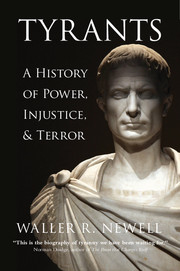Book contents
- Frontmatter
- Contents
- Preface
- Acknowledgments
- Introduction: The Strange Career of Tyranny
- Part One The Rage of Achilles: From Homeric Heroes to Lord and God of the World
- Part Two City of God or City of Man? The Tyrant as Modern State Builder
- Part Three The Eagles Will Drop Dead from the Skies: Millenarian Tyranny from Robespierre to Al Qaeda
- Conclusion How Democracy Can Win
- Reading for Further Interest
- Index
Part Two - City of God or City of Man? The Tyrant as Modern State Builder
Published online by Cambridge University Press: 05 March 2016
- Frontmatter
- Contents
- Preface
- Acknowledgments
- Introduction: The Strange Career of Tyranny
- Part One The Rage of Achilles: From Homeric Heroes to Lord and God of the World
- Part Two City of God or City of Man? The Tyrant as Modern State Builder
- Part Three The Eagles Will Drop Dead from the Skies: Millenarian Tyranny from Robespierre to Al Qaeda
- Conclusion How Democracy Can Win
- Reading for Further Interest
- Index
Summary
In 410 AD, Rome, the Eternal City was sacked by Alaric the Visigoth and his forces. They didn't do tremendous damage. Alaric had been a Roman ally and general. He felt the imperial government had welched on their deal – occupying the city was meant to apply bargaining pressure. Rome at this point was not even the capital of the western empire – it had moved to Ravenna. Yet so famous was her name and history that the entire Roman world was traumatized. The city had not been invaded for eight hundred years. As Saint Jerome wrote, “if Rome can perish, who can be safe?”
The psychological impact was akin to the German occupation of Paris in 1870 or the attack on New York on September the 11th – a devastating blow from without that was felt by many to be the earned comeuppance for years of moral drift and corruption. Many believed that the newly dominant religion of Christianity was responsible for sapping the manly fiber of old Roman virtue. Christianity, they claimed, was pacifistic, whereas Rome's glory was based on her strength of arms. Christians had divided loyalties, and placed their otherworldly salvation above their loyalty to the state. Far from honoring Rome's unmatched success in war, Christians actively disapproved of it. The Christian emperor Constantius II ordered the removal from the Senate of the famous Altar of Victory, containing a magnificent gold statue of the goddess Victory holding a palm branch (peace for the defeated) and offering a laurel wreath (glory to the victors). Captured during the Romans’ wars of subjugation against Greece, Augustus had it placed on the Altar of Victory in the Senate to commemorate his defeat of Antony and Cleopatra at Actium. Its removal by Constantius could not have been a more stinging repudiation of the first Emperor and Rome's entire tradition of military honor. Now, pagans believed, we are paying the price for turning our back on the martial virtues that made us great.
St. Augustine wrote his classic The City of God to refute the charge that Christianity had weakened Roman virtue and so invited the barbarian invasion of the legendary and hitherto invulnerable capital. Christians, he argued, have high moral standards, higher than those of the pagans (worshipping gods who are sex fiends), and these virtues of moderation, chastity, and decency make them good citizens.
- Type
- Chapter
- Information
- TyrantsA History of Power, Injustice, and Terror, pp. 71 - 132Publisher: Cambridge University PressPrint publication year: 2016



